
Politics of Solomon Islands takes place within the framework of a parliamentary representative democratic, constitutional monarchy. Solomon Islands is an independent Commonwealth realm, where executive power is exercised by the government. Legislative power is vested in both the government and a multi-party parliament.

The 2000 Canadian federal election was held on November 27, 2000, to elect members to the House of Commons of Canada of the 37th Parliament of Canada. Prime Minister Jean Chrétien's Liberal Party won a third majority government.

The 2004 Canadian federal election was held on June 28, 2004, to elect members to the House of Commons of Canada of the 38th Parliament of Canada. The Liberal government of Prime Minister Paul Martin lost its majority but was able to continue in office as a minority government after the election. This was the first election contested by the newly amalgamated Conservative Party of Canada, after it was formed by the two right-of-centre parties, the Progressive Conservative Party and the Canadian Alliance.
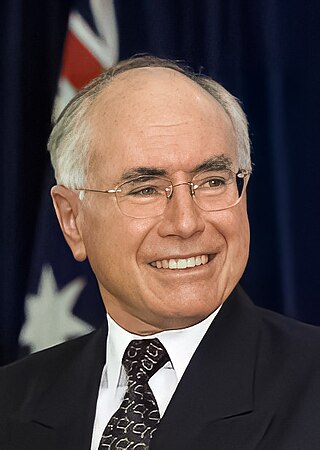
The 2001 Australian federal election was held in Australia on 10 November 2001. All 150 seats in the House of Representatives and 40 seats in the 76-member Senate were up for election. The incumbent Liberal Party of Australia led by Prime Minister of Australia John Howard and coalition partner the National Party of Australia led by John Anderson defeated the opposition Australian Labor Party led by Kim Beazley. Future Opposition Leader Peter Dutton entered parliament at this election. As of 2023 this was the most recent federal election to have a rematch in 11 years, and the most recent repeated election when Howard beat Beazley just 3 years earlier and until 2013 to have both major party leaders running in previous federal elections as major party leaders when in 2013, and the last for both major party leaders to appear in consecutive federal elections in 24 years.

The 2004 Australian federal election was held in Australia on 9 October 2004. All 150 seats in the House of Representatives and 40 seats in the 76-member Senate were up for election. The incumbent Liberal Party of Australia led by Prime Minister of Australia John Howard and coalition partner the National Party of Australia led by John Anderson defeated the opposition Australian Labor Party led by Mark Latham.
In British politics, a Lib–Lab pact is a working arrangement between the Liberal Democrats and the Labour Party.

The Liberal–National Coalition, commonly known simply as the Coalition or the LNP, is an alliance of centre-right to right-wing political parties that forms one of the two major groupings in Australian federal politics. The two partners in the Coalition are the Liberal Party of Australia and the National Party of Australia. Its main opponent is the Australian Labor Party (ALP); the two forces are often regarded as operating in a two-party system. The Coalition was last in government from 2013 to 2022. The group is led by Peter Dutton, who succeeded Scott Morrison after the 2022 federal election.

The Solomon Islands Liberal Party (SILP) was a political party in the Solomon Islands.

General elections were held in Sweden on 17 September 2006, to elect members to the Riksdag, the Swedish national legislature. All 349 seats were up for election: 310 fixed seats in 29 constituencies and 39 adjustment seats, used to ensure that parties have representation in the Riksdag proportional to their share of the national vote. The electoral system used was semi-open list proportional representation using the Sainte-Laguë method of allocating seats. Elections for County and Municipal councils were also held on the same day.
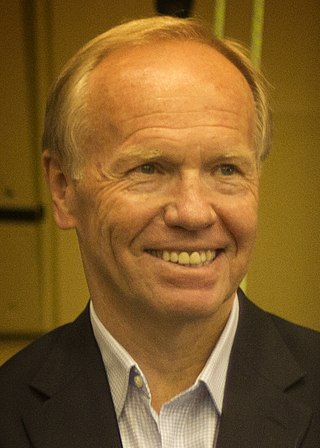
An election was held in the Australian state of Queensland on 9 September 2006 to elect the 89 members of the state's Legislative Assembly, after being announced by Premier Peter Beattie on 15 August 2006.
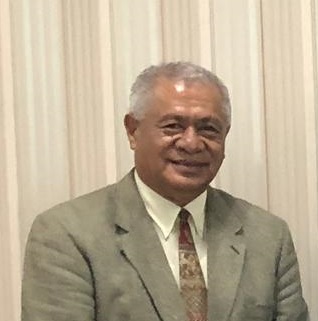
Anare Jale is a Fijian civil servant, diplomat, and politician. He is a former member of the Parliament of Fiji, and vice-president of the Social Democratic Liberal Party.
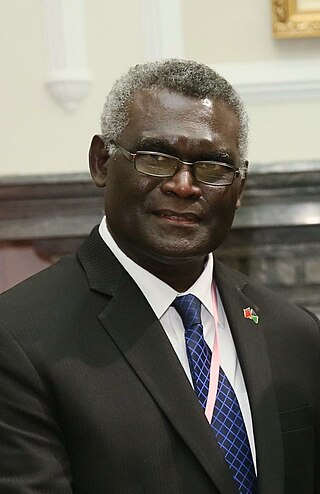
Manasseh Damukana Sogavare is a Solomon Islander politician who served as the prime minister of Solomon Islands for a total of nine years from 2000–2001, 2006–2007, 2014–2017, and 2019–2024. Sogavare has served in the National Parliament representing East Choiseul since 1997.

Bartholomew (Bart) Ulufa'alu CMG was the prime minister of Solomon Islands from 27 August 1997 to 30 June 2000.
The Solomon Islands Social Credit Party ("Socreds") was a political party in the Solomon Islands that espoused social credit theories of monetary reform. It opposed foreign interference in the economy of the country.
A minor party is a political party that plays a smaller role than a major party in a country's politics and elections. The difference between minor and major parties can be so great that the membership total, donations, and the candidates that they are able to produce or attract are very distinct. Some of the minor parties play almost no role in a country's politics because of their low recognition, vote and donations. Minor parties often receive very small numbers of votes at an election. The method of voting can also assist or hinder a minor party's chances. For example, in an election for more than one member, the proportional representation method of voting can be advantageous to a minor party as can preference allocation from one or both of the major parties.
Electoral reform is a change in electoral systems which alters how public desires are expressed in election results.

General elections were held in Sweden on 14 September 2014 to elect all 349 seats in the Riksdag, alongside elections for the 21 county councils, and 290 municipal assemblies.
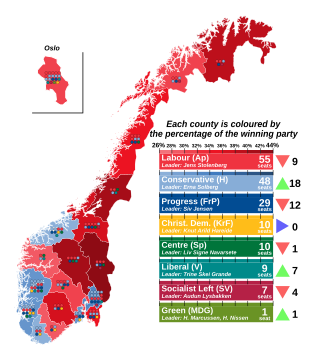
Parliamentary elections were held in Norway on 8 and 9 September 2013 to elect all 169 members of the unicameral Storting. The centre-right coalition obtained 96 seats, while the incumbent red–green coalition government obtained 72 seats and the Green Party obtained one. The Labour Party won the largest share (30.8%) of the votes cast, with the Conservatives coming second (26.8%), after increasing its share by 9.6 percentage points.
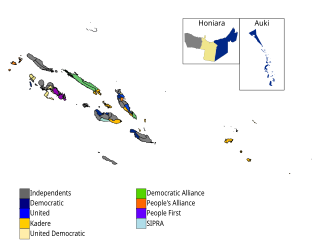
General elections were held in Solomon Islands on 3 April 2019 to determine the composition of the 11th Parliament. The election was the first to occur since the conclusion of the Regional Assistance Mission to the Solomon Islands (RAMSI) in 2017. Parliament passed amendments to the electoral act in 2018 that included the introduction of pre-polling, a significant increase in campaign budgets for candidates and stricter penalties for individuals committing electoral offences such as vote-buying. Ten of the thirteen parties that contested the election won seats, and the Solomon Islands Democratic Party and the Kadere Party were the parties that secured the highest amount, winning eight each. However, as in previous elections, independent candidates won the largest share of seats, securing 21.













